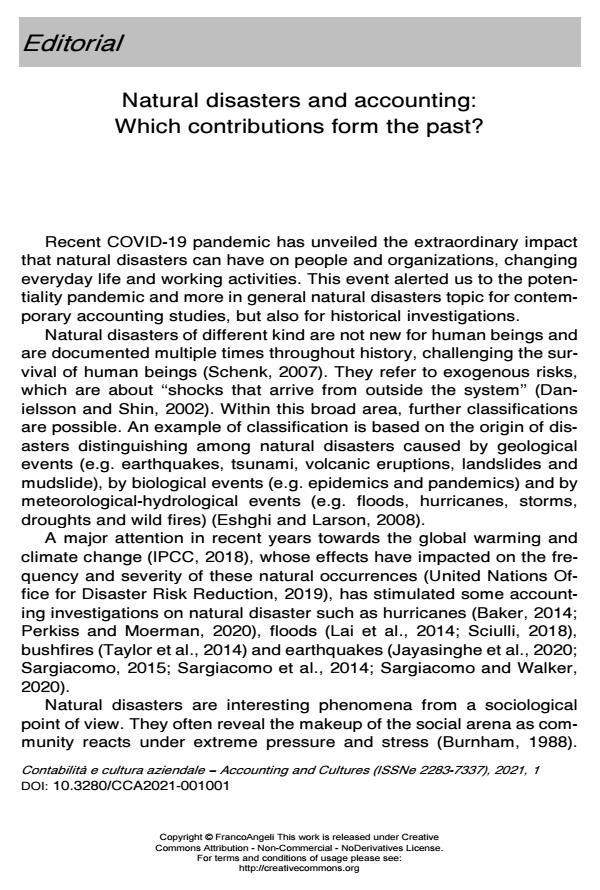Natural disasters and accounting: Which contributions form the past?
Journal title CONTABILITÀ E CULTURA AZIENDALE
Author/s Stefania Servalli, Massimo Sargiacomo
Publishing Year 2021 Issue 2021/1
Language English Pages 5 P. 5-9 File size 57 KB
DOI 10.3280/CCA2021-001001
DOI is like a bar code for intellectual property: to have more infomation
click here

FrancoAngeli is member of Publishers International Linking Association, Inc (PILA), a not-for-profit association which run the CrossRef service enabling links to and from online scholarly content.
- Walker S. (2014). Drought, resettlement and accounting. Critical Perspectives on Accounting, 25(7): 604-619.
- Baker R. (2014). Breakdown of accountability in the face of natural disasters: The case of Hurricane Katrina. Critical Perspectives on Accounting 25(7): 620-632.
- Burnham J.C. (1988). A neglected field: the history of natural disasters. Perspectives on History, April.
- Carnegie G.D. and Napier C.J. (1996) Critical and interpretive histories: Insights into accounting’s present and future through its past. Accounting, Auditing & Accountability Journal, 9(3): 7-39.
- Carnegie G.D. and Napier C.J. (2002), Exploring comparative international accounting history. Accounting, Auditing & Accountability Journal, 15(5): 689-718.
- Danielsson J and Shin H.S. (2002). Endogenous risk. In Modern Risk Management – A History. Risk Books.
- Eshghi K. and Larson R.C. (2008). Disasters: lessons from the past 105 years. Disaster Prevention and Management, 17(1).
- Gomes D. and Sargiacomo M. (2013). Accounting and accountability in local government: An introduction. Accounting History, 18(4): 439-446.
- Hunter J. and Ogasawara K. (2019). Price shocks in regional markets: Japan’s Great Kantō Earthquake of 1923. Economic History Review, 72(4): 1335-1362.
- International Panel on Climate Change (2018). Global Warming of 1.5°C. An IPCC Special Report on the impacts of global warming of 1.5°C above pre-industrial levels and related global greenhouse gas emission pathways, in the context of strengthening the global response to the threat of climate change, sustainable development, and efforts to eradicate poverty.
- Imaizumi A., Ito K. and Okazaki T. (2016). Impact of natural disasters on industrial agglomeration: The case of the Great Kantō Earthquake in 1923. Explorations in Economic History, 60: 52-68.
- Jayasinghe K., Kenney C., Prasanna R. and Velasquez J. (2020). Enacting ‘accountability in collaborative governance’: Lessons in emergency management and earthquake recovery from the 2010-2011 Canterbury Earthquakes. Journal of Public Budgeting, Accounting & Financial Management, 32(3): 439-459.
- Lai A., Leoni G. and Stacchezzini R. (2014). The socializing effects of accounting in flood recovery. Critical Perspectives on Accounting, 25(7): 579-603.
- Manetti G., Bellucci M. and Bagnoli L. (2017). The management of the plague in Florence at the beginning of the Renaissance: The role of the partnership between the Republic and the Confraternita of Misericordia. Accounting History, 22(4): 510-529.
- Miley F. and Read A. (2013). After the quake: The complex dance of local government, national government and accounting. Accounting History, 18(4): 447-471.
- Odell K.A. and Weidenmier M.D. (2004). Real shock, monetary aftershock: The 1906 San Francisco earthquake and the panic of 1907. Journal of Economic History, 64(4): 1002-1027.
- Okazaki T., Okubo T. and Strobl E. (2019). Creative destruction of industries: Yokohama City in the Great Kantō Earthquake, 1923. Journal of Economic History, 79(1): 1-31.
- Pereira A.S. (2009). The opportunity of a disaster: The economic impact of the 1755 Lisbon earthquake. Journal of Economic History, 69(2): 466-499.
- Perkiss and Moerman (2020). Hurricane Katrina: Exploring justice and fairness as a sociology of common good(s). Critical Perspectives on Accounting, 67-68: 102022.
- Sargiacomo M. (2015). Earthquakes, exceptional government and extraordinary accounting. Accounting, Organizations and Society, 42: 67-89.
- Sargiacomo M., Ianni L. and Everett J. (2014). Accounting for suffering: Calculative practices in the field of disaster relief. Critical Perspectives on Accounting, 25(7): 652-669.
- Sargiacomo M. and Walker S. (2020). Disaster governance and hybrid organizations: Accounting, performance challenges and evacuee housing. Accounting, Auditing & Accountability Journal. Epub ahead of print 19 January.
- Sargiacomo M., Servalli S., Potito S., D’Andreamatteo A. and Gitto A. (2021), Accounting for natural disasters from a historical perspective: A literature review and research agenda. Accounting History, 26(2):179-204.
- Schenk G.J. (2007). Historical Disaster Research. State of Research, Concepts, Methods and Case Studies. Historical Social Research /Historische Sozialforschung, 32(3).
- Sciulli N. (2018). Weathering the storm: Accountability implications for flood relief and recovery from a local government perspective. Financial Accountability & Management, 34(1): 30-44.
- Shimizu Y. and Fujimura S. (2010). Accounting in disaster and accounting for disaster: The crisis of the Great Kanto Earthquake, Japan, 1923. Accounting, Business & Financial History, 20(3): 303-316.
- Siodla J. (2017). Clean slate: Land-use changes in San Francisco after the 1906 disaster. Explorations in Economic History, 65(C): 1-16.
- Taylor D., Tharapos M., Khan T. and Sidaway S. (2014), Downward accountability for Victoria’s ‘Black Saturday’ bushfire recovery: Evidence from reports of government and NGOs. Critical Perspectives on Accounting, 25(7): 633-651.
- United Nations Office for Disaster Risk Reduction (2019). Global Assessment Report on Disaster Risk Reduction. Washington, DC: United Nations.
- Vosslamber R. (2015). After the earth moved: Accounting and accountability for earthquake relief and recovery in early twentieth-century New Zealand. Accounting History, 20(4): 518-535.
Stefania Servalli, Massimo Sargiacomo, Natural disasters and accounting: Which contributions form the past? in "CONTABILITÀ E CULTURA AZIENDALE" 1/2021, pp 5-9, DOI: 10.3280/CCA2021-001001